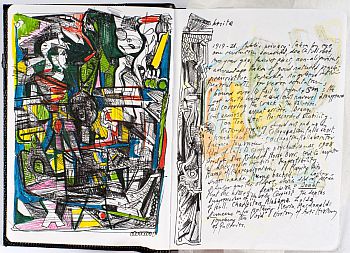Avant-garde artist’s papers open to public at new University of Sussex home
Papers belonging to the late avant-garde poet and artist Anna Mendelssohn will be opened up to the public next week at a special event at The Keep archive centre – home to the University’s Special Collections.
 The Anna Mendelssohn collection includes notebooks, correspondence, artwork, loose-leaf writings and oil paintings.
The Anna Mendelssohn collection includes notebooks, correspondence, artwork, loose-leaf writings and oil paintings.
Born in 1948, Anna Mendelssohn was an activist and a highly regarded avant-garde writer and artist.
In 1972, she was sentenced to prison for her political activities; post prison she was accepted to the University of Cambridge to read English and went on to become a prolific artist and poet, publishing under the pseudonym Grace Lake.
When she died in 2009, she left behind a “vast, glorious collection of manuscripts and drawings”, which has been donated to the University by her family.
After months of painstaking cataloguing by the Special Collections team, her archive is now ready to open to the public.
The collection includes nearly 800 notebooks, a considerable array of correspondence, artwork and loose-leaf writings, and more than 40 oil paintings.
A series of public talks and a hands-on workshop to celebrate the opening will take place on Friday 16 October at The Keep, close to Falmer train station.
Dr Sara Crangle, Director of the Centre for Modernist Studies at Sussex, will speak at the event alongside Jill Richards, Assistant Professor of English at Yale. Dr Crangle says: “This is a wonderful opportunity to interactively explore this vast, glorious collection of manuscripts and drawings.
“Anna Mendelssohn was prolific and, while not a household name today, was a hugely important figure in the feminist vanguard. We are grateful to her family for entrusting us with her work.”
Fiona Courage, Head of Special Collections, said: “We are pleased to add this extensive archive to Special Collections as it complements our other holdings relating to literature, art and political movements and we look forward to being able to support researchers as they explore the different aspects of Mendelssohn’s life.”

